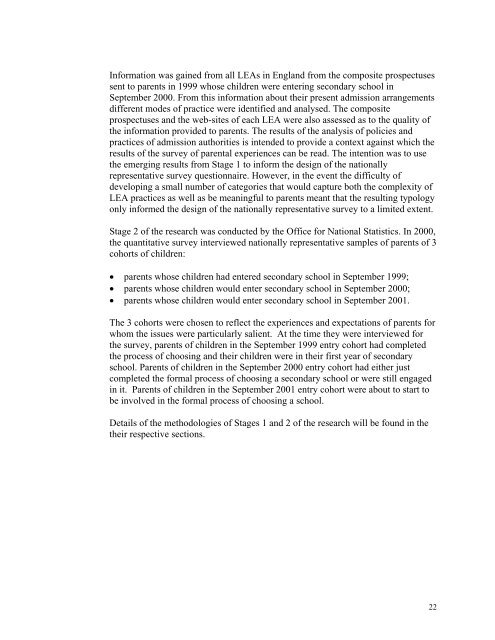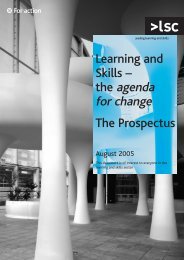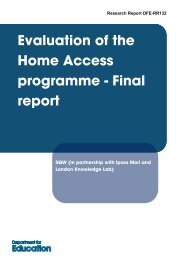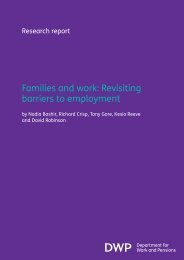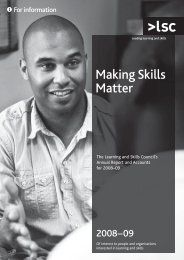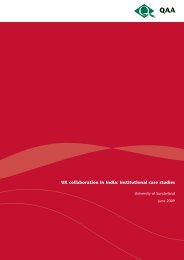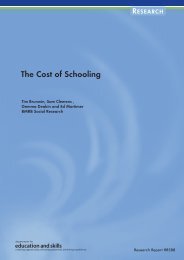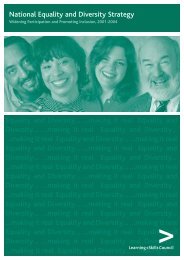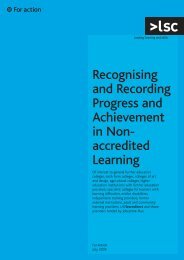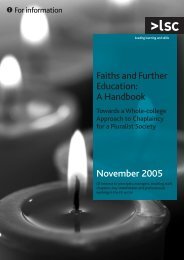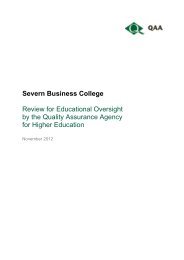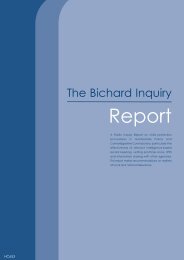Parents' Experiences of the Process of Choosing a Secondary School
Parents' Experiences of the Process of Choosing a Secondary School
Parents' Experiences of the Process of Choosing a Secondary School
Create successful ePaper yourself
Turn your PDF publications into a flip-book with our unique Google optimized e-Paper software.
Information was gained from all LEAs in England from <strong>the</strong> composite prospectuses<br />
sent to parents in 1999 whose children were entering secondary school in<br />
September 2000. From this information about <strong>the</strong>ir present admission arrangements<br />
different modes <strong>of</strong> practice were identified and analysed. The composite<br />
prospectuses and <strong>the</strong> web-sites <strong>of</strong> each LEA were also assessed as to <strong>the</strong> quality <strong>of</strong><br />
<strong>the</strong> information provided to parents. The results <strong>of</strong> <strong>the</strong> analysis <strong>of</strong> policies and<br />
practices <strong>of</strong> admission authorities is intended to provide a context against which <strong>the</strong><br />
results <strong>of</strong> <strong>the</strong> survey <strong>of</strong> parental experiences can be read. The intention was to use<br />
<strong>the</strong> emerging results from Stage 1 to inform <strong>the</strong> design <strong>of</strong> <strong>the</strong> nationally<br />
representative survey questionnaire. However, in <strong>the</strong> event <strong>the</strong> difficulty <strong>of</strong><br />
developing a small number <strong>of</strong> categories that would capture both <strong>the</strong> complexity <strong>of</strong><br />
LEA practices as well as be meaningful to parents meant that <strong>the</strong> resulting typology<br />
only informed <strong>the</strong> design <strong>of</strong> <strong>the</strong> nationally representative survey to a limited extent.<br />
Stage 2 <strong>of</strong> <strong>the</strong> research was conducted by <strong>the</strong> Office for National Statistics. In 2000,<br />
<strong>the</strong> quantitative survey interviewed nationally representative samples <strong>of</strong> parents <strong>of</strong> 3<br />
cohorts <strong>of</strong> children:<br />
• parents whose children had entered secondary school in September 1999;<br />
• parents whose children would enter secondary school in September 2000;<br />
• parents whose children would enter secondary school in September 2001.<br />
The 3 cohorts were chosen to reflect <strong>the</strong> experiences and expectations <strong>of</strong> parents for<br />
whom <strong>the</strong> issues were particularly salient. At <strong>the</strong> time <strong>the</strong>y were interviewed for<br />
<strong>the</strong> survey, parents <strong>of</strong> children in <strong>the</strong> September 1999 entry cohort had completed<br />
<strong>the</strong> process <strong>of</strong> choosing and <strong>the</strong>ir children were in <strong>the</strong>ir first year <strong>of</strong> secondary<br />
school. Parents <strong>of</strong> children in <strong>the</strong> September 2000 entry cohort had ei<strong>the</strong>r just<br />
completed <strong>the</strong> formal process <strong>of</strong> choosing a secondary school or were still engaged<br />
in it. Parents <strong>of</strong> children in <strong>the</strong> September 2001 entry cohort were about to start to<br />
be involved in <strong>the</strong> formal process <strong>of</strong> choosing a school.<br />
Details <strong>of</strong> <strong>the</strong> methodologies <strong>of</strong> Stages 1 and 2 <strong>of</strong> <strong>the</strong> research will be found in <strong>the</strong><br />
<strong>the</strong>ir respective sections.<br />
22


